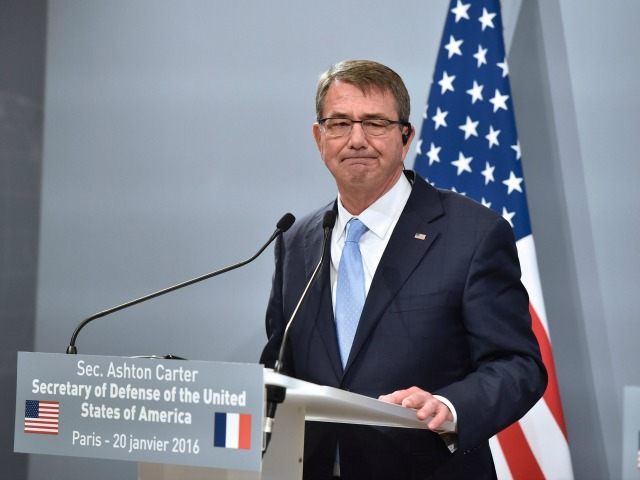Secretary of Defense Ashton Carter, speaking from the World Economic Forum in Davos to CNBC, stated that America must put more “boots on the ground” in Iraq to defeat the Islamic State, but promised they will not actually do any fighting.
Carter appeared particularly interested the long-planned invasion of Mosul, the Islamic State’s capital in Iraq, and a final battle further down the line to retake the Syrian fortress of Raqqa, effectively wiping out the “caliphate.” He said he was confident of defeating ISIS, but added that he wants to “accelerate the process.”
To that end, he will soon meet with defense ministers from coalition countries and urge them to make greater contributions to the anti-ISIS effort:
In two weeks, Carter will meet with a broad group of defense ministers where he said he will press those who are in the fight “on paper” but are not doing enough.
“We’re prepared to do a great deal because we have the finest fighting force the world has ever seen. We can do a lot ourselves,” Carter said. “The United States does not ask people for favors, but we don’t grant favors either, and so we’re looking for other people to play their part.”
To get those players on board, Carter said he would share U.S. operations plans with defense ministers.
Carter said the United States would continue to keep boots on the ground, but would remain focused on advising and assisting Iraqi, Kurdish and Syrian Arab forces to take and hold territory.
“I don’t think we or anybody else can substitute for them, but there’s a lot we can do to enable them, including being on the ground with them,” he said.
“We’re looking for opportunities to do more, and there will be boots on the ground — I want to be clear about that — but it’s a strategic question, whether you are enabling local forces to take and hold, rather than trying to substitute for them.”
Convincing other coalition partners to throw more troops in the fight without making a comparable American commitment is not easy. A few days ago, Carter was lecturing Turkey about not doing more against the Islamic State. “Just as I am asking everybody else in the coalition to step up and do more… just as the US military is doing more, so we would like to see Turkey to do more also,” he said.
If the U.S. military “doing more” amounts to training missions and a little help with battlefield reconnaissance, other coalition members are apt to wonder why they should make any more expensive and hazardous effort. That is especially true when some coalition partners have concerns they feel are more urgent than crushing ISIS, such as Turkey’s constant fear of a Kurdish state taking shape.
Carter has already admitted U.S. special forces deployed against ISIS are conducting “direct action”; in fact, earlier this week, he was talking up how many other important functions they perform besides conducting raids, such as collecting intelligence about the inner workings of the Islamic State, developing relationships with regional militias, and helping pick targets for air strikes.
But of course, the Defense Secretary must work under the political imperative of making it look as if President Obama’s “no boots on the ground in Iraq” promise has not been broken. There’s also the delicate matter of Shiite militia leaders vowing to stop fighting ISIS and attack American troops if they are deployed into northern Iraq. In the long term, the Administration considers it vital to portray the recapture of Mosul as primarily an Iraqi operation.
One other, absolutely vital, consideration is that the Battle of Mosul must succeed. It would be catastrophic if the long-delayed operation becomes a debacle. Not only must Iraqi troops be trained to perform far better than they did during the original ISIS incursion, they must be carefully monitored, directed, and swiftly reinforced, if ISIS defenders in Mosul appear to be getting the upper hand.
Increasing the number of American trainers and advisers in the mix will help direct the Iraqi forces in battle, help them coordinate with the Kurds who hit Mosul from the opposite direction, and make it possible for U.S. troops to provide quick support for Iraqi units in trouble. Also, it will help American commanders judge if the Iraqis are ready to tackle an operation like Mosul. If American commanders have any doubts, expect the liberation of Mosul to be delayed again.

COMMENTS
Please let us know if you're having issues with commenting.